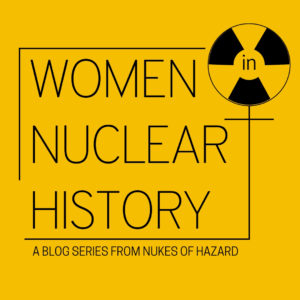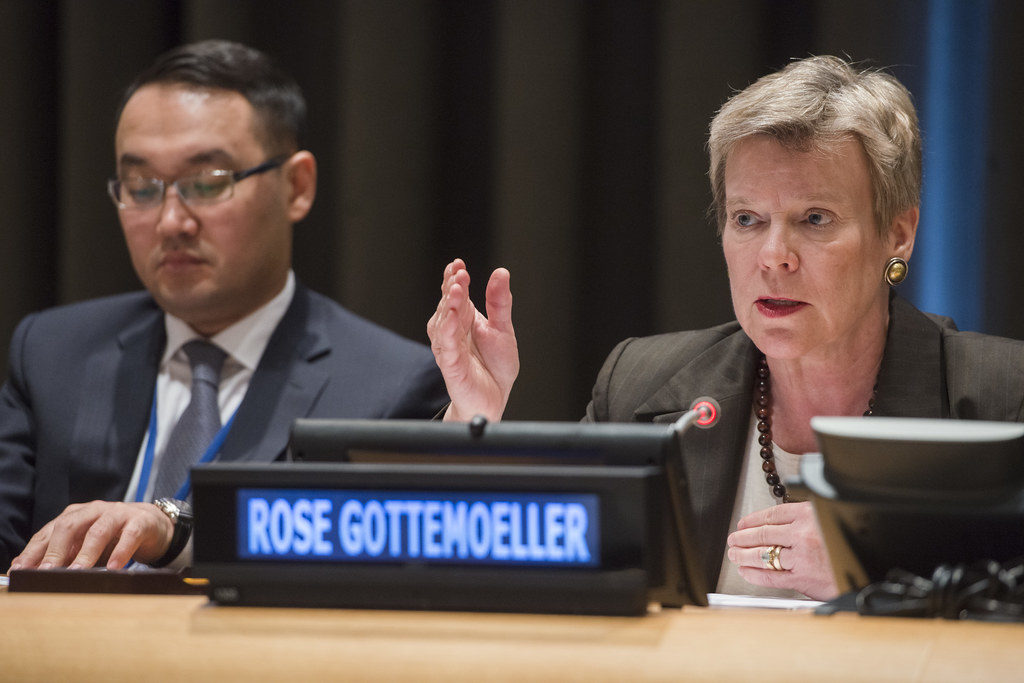By Rachel Emond, Scoville Fellow
 Rose Gottemoeller: The lead U.S. negotiator for New START who now serves as the Deputy Secretary General of NATO and has committed her career to making the world a more stable, safe place to live.
Rose Gottemoeller: The lead U.S. negotiator for New START who now serves as the Deputy Secretary General of NATO and has committed her career to making the world a more stable, safe place to live.
In Dear Madam President, Jennifer Palmieri writes, “The future is female. The past was, too. It’s just that no one thought it was important enough to bother writing it all down.” Beyond recognizing people in general for the positive work they do, this emphasizes the importance of amplifying the work of women, in particular. In the second installment of the Women in Nuclear History series, I am excited to highlight a woman who has had a remarkable influence not only on U.S. nuclear policy, but on global nuclear policy, as well.
Rose Gottemoeller was born in Columbus, Ohio, hailing from a German Catholic family with five other siblings. She was a curious and intelligent student from a young age. In high school, she became fluent in Russian so she could translate Russian scientific publications. She then earned a bachelor’s degree in Russian from Georgetown University. In 1979, she went to work for the RAND Corporation, a global policy think tank, as a researcher, while simultaneously pursuing a master’s degree at George Washington University.
Rose has held a number of significant positions related to Russian relations and nuclear policy. After leaving the RAND Corporation, she served as the Director of Russia, Ukraine, and Eurasia Affairs for the National Security Council with a special emphasis on nuclear threat reduction. She then moved to the Department of Energy, first as Assistant Secretary and Director for Non-proliferation and National Security, then as Deputy Under Secretary of Energy for Defense Nuclear Non-proliferation. She began working for the Carnegie Endowment for International Peace in 2000 in both the non-proliferation and Russia programs, and was appointed to serve as the Director of the Carnegie Moscow Center in 2006.
Rose joined the State Department in 2009. Before she stepped into the role of Under Secretary for Arms Control and International Security, she began as the Assistant Secretary of State for the Bureau of Arms Control, Verification and Compliance (AVC). It was during this time that she served as the United States’ lead negotiator for the New Strategic Arms Reduction Treaty (New START), a bilateral treaty with Russia that effectively reduced nuclear stockpiles and provides ongoing transparency between the world’s two biggest nuclear powers. After the deal was signed, her team also oversaw the ratification and implementation of the treaty. The New START negotiating team was a highly competent group of experts, lawyers and former inspectors, but Rose was the ringer. Her background in nuclear policy combined with her familiarity with the Russian language and culture were critical assets in securing the eventual successful outcome.
Rose was actually the first woman to ever lead a strategic nuclear reduction negotiation, and she was present when New START was signed on April 8, 2010. She also watched as the Senate voted to give its advice and consent to ratification on December 22, 2011.

At a recent panel hosted by New America, following the release of the report, “The Consensual Straitjacket”: Four Decades of Women in Nuclear Security,” Rose spoke about why her role as a woman leading the American negotiating team was important.
“Women knock the routine off balance in a way that can be helpful,” she said. “The Russians didn’t know what to expect. I was able to use being a woman to cut through the crap.”
A few men on the Russian delegation were surprised to find that Rose had the technical details down cold, and when she reached out to the women on the Russian delegation (most of whom were secretaries, lawyers, and translators) to send them gifts, the men were jealous and sought out a better relationship with her as a result. Rose clearly knew she was being underestimated as a woman, and she used it to her advantage.
Now, she serves as an international civil servant in her position as the Deputy Secretary General of NATO. This is the highest rank a woman has ever risen to within the organization. Since her appointment, NATO has begun taking the role women play in the global community more seriously.
In September 2018, Rose said, “We know that we at NATO need to do a better job [paying attention to the role of women in security] because stability, security, and conflict resolution only come about when women are fully engaged and able to work together and with their governments and with us to ensure that problems get solved down to the level of the village and the local government.”
This level of commitment to gender equity from an international organization that primarily serves as a military alliance is groundbreaking. It reinforces the critical need for empowering women and other marginalized communities when implementing foreign policy at any level, and it’s inspiring to see an international leader devote their time and attention to this cause.
Historically, Rose, like many women in national security, often chooses to avoid the direct limelight. While serving in the Clinton Administration, she said she has two slogans: “One, keep your eyes on the prize and don’t worry about the nonsense. And two, that you’ll be amazed how much you can get done in this town if you don’t take the credit.”
At the New America panel, I asked Rose whether she would still give the same advice about not seeking credit at this stage in her career. After agreeing with other panelists about the importance of focusing on impact over credit, Rose simply stated, “In answer to whether I still offer up that advice, the answer is ‘yes.’”
Rose’s spectacularly successful career has spanned more than 35 years, and people all over the world owe a piece of our safety to her skills and commitment. Here at Nukes of Hazard, we’re happy to give her the credit she deserves.
